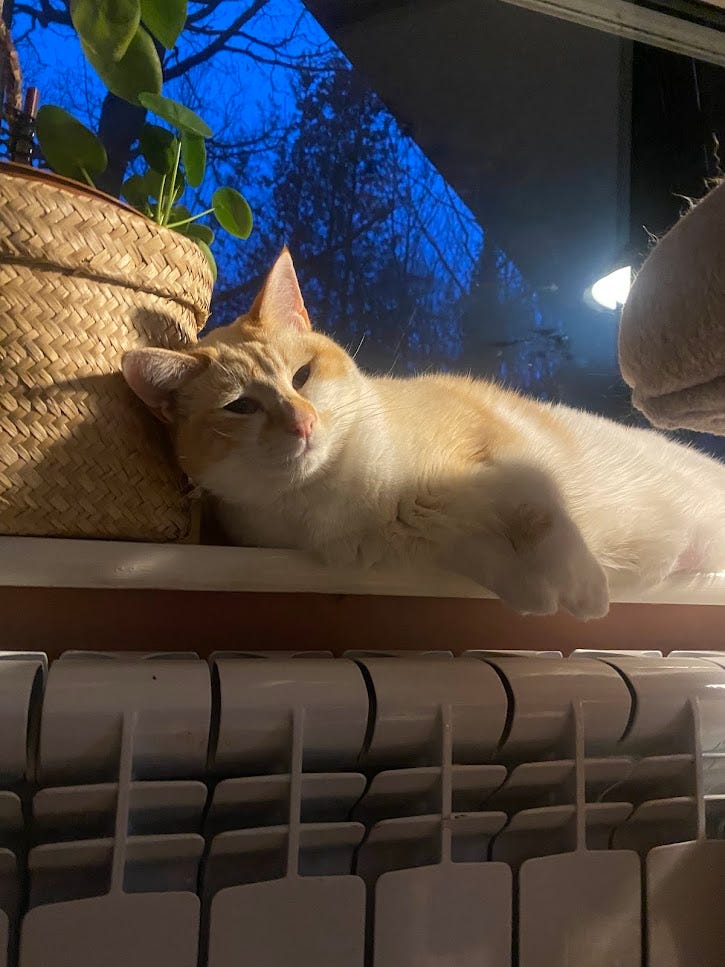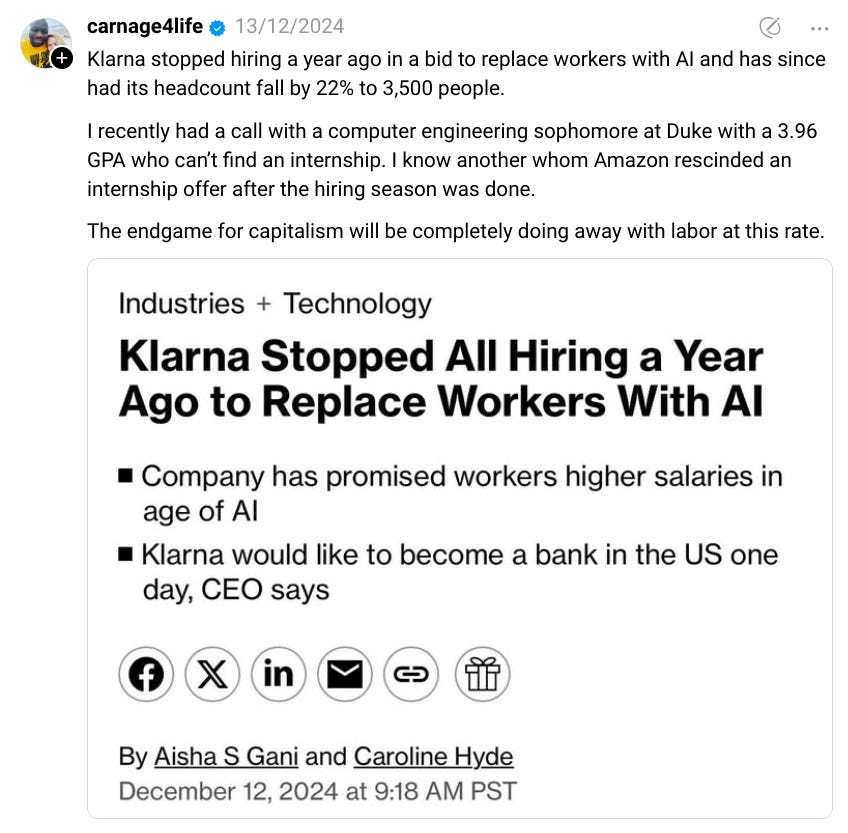Don't go burning career bridges
Firing vapers, early careers predictions, and when I met a GoT star
Hello!
Thank you for joining me, I’m so glad you’re here.
I’ve had some good feedback on the audio accompaniment to last week’s post, so I will carry on with it for the time being. Annoyingly, my stats don’t cover how many people listened, but I figure that any kind of accessibility step is one worth taking. Alt text for images on Substack is really quick hard to do; the box that opens is very small, and I can’t see the whole text at once. I feel guilty about it, but I don’t always write alt text for that reason, so perhaps the audio read along will help if I did have any readers with sight loss.
This week I had a really lovely chat with someone who interviewed me almost a decade ago. I didn’t get the job at the time, but I added her on LinkedIn and we’ve kept in touch. It was great catching up, telling her about what I’m up to, and getting some really great advice. I really appreciated being able to bounce ideas around with her.
In these rough times for jobseekers, I wanted to mention this because it’s important to not burn bridges after an interview. I have personally hired people I’ve previously rejected (and some were amazing hires, especially in intern and apprentice recruitment processes where the volume can be very high).
It’s also a great example of why a human-centred recruitment process is important. A lot of processes are moving to ones where candidates don’t speak with recruiters until interviews are booked; that the screening call is replaced with a one-way video, or just not done at all. It’s hard to juggle maintaining a good candidate experience through high volume recruitment (and as the market stands right now, it’s mostly high volume), but where possible, I think the effort really does pay off.
My team (a mix of millennials and gen z) enjoyed Dojo’s study on generations in the workplace this week. I was reading out sections, getting them to guess the answers.
We honed in on the 1 in 5 bosses who may not pass an employee’s probation due to them vaping (which we unanimously felt was unfair). The report got us talking about a range of really great topics around culture and acceptance in the workplace.
The Dojo report has lots to digest within it, including gen z’s apparent keenness to write funny out of office emails, and that 75% of gen z share confidential work information with friends.
I like that the study was conducted across different sectors, as a lot of these things stick with creative/start-up/tech knowledge companies when of course there are so many more experiences outside these sectors.
My family has a Christmas tradition where we submit predictions for the year to my youngest sister, and then read them out over the Christmas table the following year. They can be about our family (last year we all correctly predicted that our poor 93 year old Grandma will still be around, but I was thankfully wrong in my prediction that my sister will have her phone stolen yet again). Or they can be general predictions (I guessed that Rachel Reeves would be chancellor, my brother-in-law predicted the UK would come 7th in the Olympics).
This year our prediction process was not our main focus while we had a brand new member of the family born in Betwixmas, but my one and only offering was that I think there will be a great resignation again in the summer.
Now, I know that this is really going against the grain here. I am a lone voice being optimistic that the market will pick up this year. But the thing is, the recruiter job market is really booming right now, especially in early careers. All these recruiters will have to be recruiting.
I think at the very least, 2025 will be a major turning point for the job landscape. As Lars Schmidt (whose book Redefining HR [Kogan Press] is very good) predicts [Fast Company], AI will vastly change the entry-level job market, meaning that there won’t be a natural pipeline for talent.
In at least one team in my organisation, a combination of a strong need for highly skilled talent, and historically effortless talent attraction, has meant that in a post-pandemic world with changed access to talent, we don’t have the people we need. What’s more, there aren’t logical entry points into the team for people to access and grow from. And I know we’re not alone.
What I think will happen is that there will be a rise in the kind of rotational early careers programme where there’s no value added by the participants, but they will be in a good place to be skilled up by the end of it. And perhaps this is why so many early careers specialists are being hired right now.
Of course, these programmes are costly, with a delayed benefit to the company, so it’ll be interesting to see how smaller companies navigate things. With fewer entry points to experience opportunities, and with AI taking more entry-level work, the talent will become scarce and something will have to give.
Will end with this Thread about Klarna (which isn’t the greatest company to begin with) halting all recruitment, to replace roles with AI.
Links
Substack
Here’s a lovely link from Christmas, about creating Christmas events (specifically markets). Since the UK events industry contributes over £10 billion to the economy each year, this is a great insight into the fascinating industry and the careers possible.
Another Substack that gives insight into a career is this one from Stevie Martin, who talks about her work as a voice actor. It was an interesting read for me, as back when I worked at Nintendo (Japanese → English translator in Frankfurt) I flew to London to work on the voice recording of one of our games. I was 100% unqualified for the task of managing the voice acting, ensuring they are good enough for the game. Fun fact: Thomas Brodie-Sangster was one of the voice actors and literally had just got off the plane from LA where he was shooting GoT, and came to the studio. He was lovely and very professional even though I think the producer was trying to rip him a new one in an attempt to show that he knows more than this “big shot”. Another fun fact: Thomas is now married to Elon Musk’s ex [Reddit].
Someone dear to me was let go on Friday, and it made me angry how companies can treat people as disposable. I did a ragey LinkedIn post, which includes a great podcast episode containing lots of great advice for those who have been fired.
A great post from Talent Acquisition Director Lee Harding around how to navigate the salary conversation when applying for a role.
An interesting LinkedIn post combo here, around the theme of letting young people do scary things VS letting young people have a way out if they’re unable to do scary things. First up, commentary around a college training students on how to speak on a phone. Next we have a conversation around whether it’s OK for parents to email professionals to ask for work experience on behalf of their children. Lots of great points in both posts, and the comments below.
Lastly, LinkedIn have created a space for students and graduates and, well, it looks incredibly underwhelming. It looks like something I knocked up on Canva. Surely they could have done something much better than this??
I’ll leave you today with this TikTok from a guy called Sam who is doing some really charming “day in the life” content. He doesn’t go into what he does, but I like the view it gives of what someone working in the creative world in London might be doing.
 Tiktok failed to load.
Tiktok failed to load.Enable 3rd party cookies or use another browser
Until next week!
Have a great week ahead!
Charlotte









